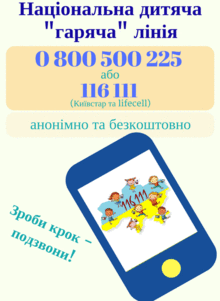
Структура навчального року
Орієнтовна структура
2025/2026 навчального року
Навчальні заняття починаються з 1 вересня 2025 року.
Навчальні заняття організовуються за семестровою системою:
І семестр - з 1 вересня по 27 грудня 2025 року,
ІІ семестр - з 12 січня по 29 травня 2026 року.
Орієнтовні терміни канікул
- осінні - з 26 жовтня по 02 листопада 2025 року;
- зимові- з 28 грудня 2025 року по 11 січня 2026 року;
- весняні- з 22 березня по 29 березня 2026 року;
літні канікули - з дня закінчення навчального року до 31 серпня 2026 року.
Додаткові тижневі канікули для учнів 1-х класів:
з 16 по 20 лютого 2026 року

